高三英语四种构词法
12种英语构词方法
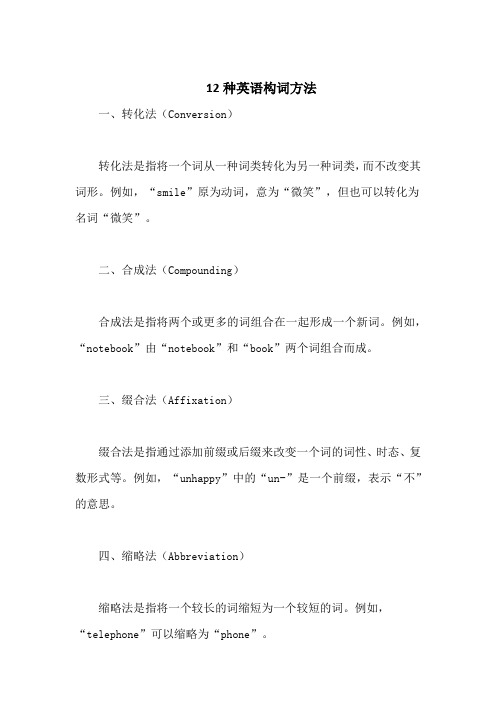
12种英语构词方法一、转化法(Conversion)转化法是指将一个词从一种词类转化为另一种词类,而不改变其词形。
例如,“smile”原为动词,意为“微笑”,但也可以转化为名词“微笑”。
二、合成法(Compounding)合成法是指将两个或更多的词组合在一起形成一个新词。
例如,“notebook”由“notebook”和“book”两个词组合而成。
三、缀合法(Affixation)缀合法是指通过添加前缀或后缀来改变一个词的词性、时态、复数形式等。
例如,“unhappy”中的“un-”是一个前缀,表示“不”的意思。
四、缩略法(Abbreviation)缩略法是指将一个较长的词缩短为一个较短的词。
例如,“telephone”可以缩略为“phone”。
五、逆生法(Backformation)逆生法是指将一个较长的词缩短为一个较短的词,并添加一个后缀来恢复原词的完整形式。
例如,“telecast”可以逆生为“broadcast”。
六、拟声法(Onomatopoeia)拟声法是指模仿声音来创造新词。
例如,“clang”模仿了金属碰撞的声音。
七、缀词法(Clipping)缀词法是指将一个词的前部分或后部分去掉,只保留中间部分。
例如,“ advertisement”可以缀为“ad”。
八、首字母缩写法(Acronymy)首字母缩写法是指将一组词的首字母组合成一个新词。
例如,“NATO”是“North Atlantic Treaty Organization”的首字母缩写。
九、混成法(Blending)混成法是指将两个或更多的词的部分混合在一起形成一个新词。
例如,“spaghetti”由“spaghetti”和“bottle”两个词混合而成。
十、词类转换法(Word Class Conversion)词类转换法是指将一个词从一种词类转换为另一种词类,同时改变其词形。
例如,“smile”可以转换为名词“smile”。
英语构词通常包括六种方法
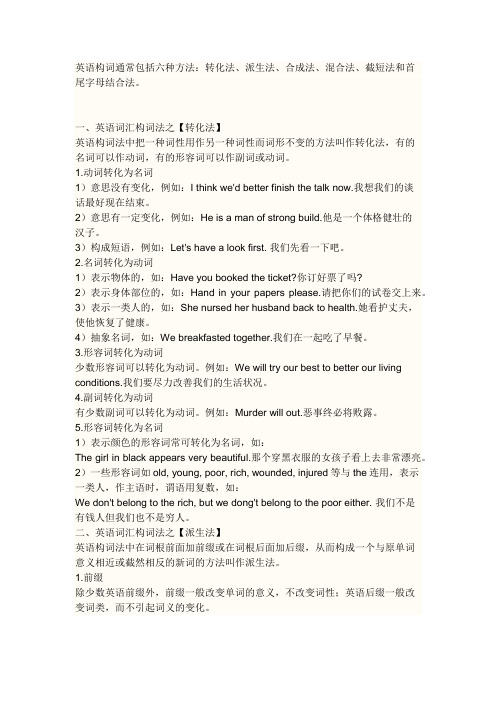
英语构词通常包括六种方法:转化法、派生法、合成法、混合法、截短法和首尾字母结合法。
一、英语词汇构词法之【转化法】英语构词法中把一种词性用作另一种词性而词形不变的方法叫作转化法,有的名词可以作动词,有的形容词可以作副词或动词。
1.动词转化为名词1)意思没有变化,例如:I think we'd better finish the talk now.我想我们的谈话最好现在结束。
2)意思有一定变化,例如:He is a man of strong build.他是一个体格健壮的汉子。
3)构成短语,例如:Let's have a look first. 我们先看一下吧。
2.名词转化为动词1)表示物体的,如:Have you booked the ticket?你订好票了吗?2)表示身体部位的,如:Hand in your papers please.请把你们的试卷交上来。
3)表示一类人的,如:She nursed her husband back to health.她看护丈夫,使他恢复了健康。
4)抽象名词,如:We breakfasted together.我们在一起吃了早餐。
3.形容词转化为动词少数形容词可以转化为动词。
例如:We will try our best to better our living conditions.我们要尽力改善我们的生活状况。
4.副词转化为动词有少数副词可以转化为动词。
例如:Murder will out.恶事终必将败露。
5.形容词转化为名词1)表示颜色的形容词常可转化为名词,如:The girl in black appears very beautiful.那个穿黑衣服的女孩子看上去非常漂亮。
2)一些形容词如old, young, poor, rich, wounded, injured等与the连用,表示一类人,作主语时,谓语用复数,如:We don't belong to the rich, but we dong't belong to the poor either. 我们不是有钱人但我们也不是穷人。
2024新高考英语复习构词法

悲伤的:sorrow—sorrowful
高雅的:grace—graceful
可耻的:shame—shameful
-less
无,不
无成效的:fruit—fruitless
无意义的:meaning—meaningless
不痛的:pain—painless
坐立不安的:rest—restless
无望的:hope—hopeless
2.形容词转换为副词
后缀 -ly
意义 以……方式
例词
绝对地:absolute—absolutely
仅仅:bare—barely
真诚地:sincere—sincerely
事实上,真实地:actual—actually
最后:eventual—eventually
很少:rare—rarely
批评性地:critical—critically
具有……特 性的;与…… 有关的
实际的:practice—practical
偶然的:accident—accidental
符合逻辑的:logic—logical
职业的:profession—professional
面部的:face—facial
金融的:finance—financial
有益的:benefit—beneficial
系统的:system—systematic 有同情心的:sympathy—sympathetic
戏剧性的:drama—dramatic
悲观的:pessimism—pessimistic
热心的:enthusiasm—enthusiastic
乐观的:optimism—optimistic
科学的:science—scientific
英语8种构词法列举
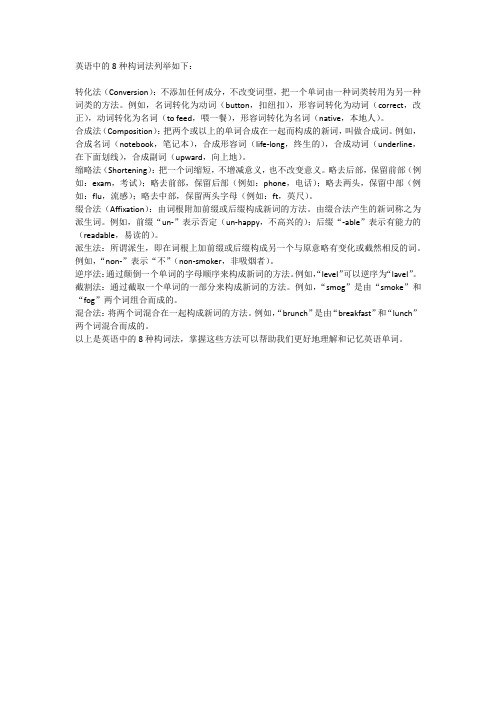
英语中的8种构词法列举如下:转化法(Conversion):不添加任何成分,不改变词型,把一个单词由一种词类转用为另一种词类的方法。
例如,名词转化为动词(button,扣纽扣),形容词转化为动词(correct,改正),动词转化为名词(to feed,喂一餐),形容词转化为名词(native,本地人)。
合成法(Composition):把两个或以上的单词合成在一起而构成的新词,叫做合成词。
例如,合成名词(notebook,笔记本),合成形容词(life-long,终生的),合成动词(underline,在下面划线),合成副词(upward,向上地)。
缩略法(Shortening):把一个词缩短,不增减意义,也不改变意义。
略去后部,保留前部(例如:exam,考试);略去前部,保留后部(例如:phone,电话);略去两头,保留中部(例如:flu,流感);略去中部,保留两头字母(例如:ft,英尺)。
缀合法(Affixation):由词根附加前缀或后缀构成新词的方法。
由缀合法产生的新词称之为派生词。
例如,前缀“un-”表示否定(un-happy,不高兴的);后缀“-able”表示有能力的(readable,易读的)。
派生法:所谓派生,即在词根上加前缀或后缀构成另一个与原意略有变化或截然相反的词。
例如,“non-”表示“不”(non-smoker,非吸烟者)。
逆序法:通过颠倒一个单词的字母顺序来构成新词的方法。
例如,“level”可以逆序为“lavel”。
截割法:通过截取一个单词的一部分来构成新词的方法。
例如,“smog”是由“smoke”和“fog”两个词组合而成的。
混合法:将两个词混合在一起构成新词的方法。
例如,“brunch”是由“breakfast”和“lunch”两个词混合而成的。
以上是英语中的8种构词法,掌握这些方法可以帮助我们更好地理解和记忆英语单词。
英语四个构词法
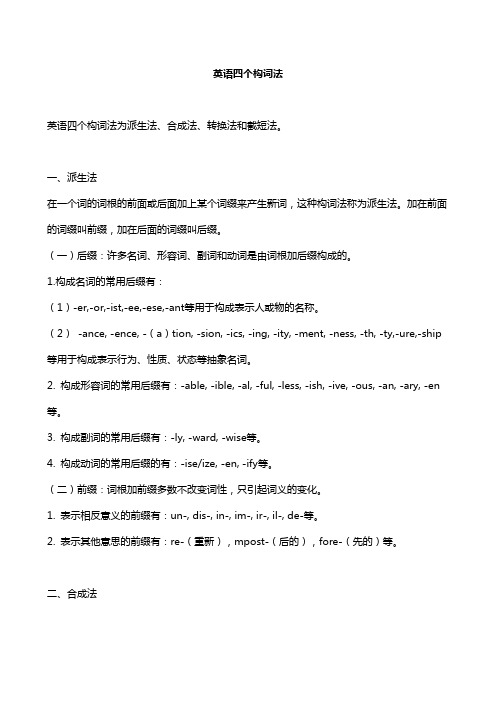
英语四个构词法英语四个构词法为派生法、合成法、转换法和截短法。
一、派生法在一个词的词根的前面或后面加上某个词缀来产生新词,这种构词法称为派生法。
加在前面的词缀叫前缀,加在后面的词缀叫后缀。
(一)后缀:许多名词、形容词、副词和动词是由词根加后缀构成的。
1.构成名词的常用后缀有:(1)-er,-or,-ist,-ee,-ese,-ant等用于构成表示人或物的名称。
(2)-ance, -ence, -(a)tion, -sion, -ics, -ing, -ity, -ment, -ness, -th, -ty,-ure,-ship 等用于构成表示行为、性质、状态等抽象名词。
2. 构成形容词的常用后缀有:-able, -ible, -al, -ful, -less, -ish, -ive, -ous, -an, -ary, -en 等。
3. 构成副词的常用后缀有:-ly, -ward, -wise等。
4. 构成动词的常用后缀的有:-ise/ize, -en, -ify等。
(二)前缀:词根加前缀多数不改变词性,只引起词义的变化。
1. 表示相反意义的前缀有:un-, dis-, in-, im-, ir-, il-, de-等。
2. 表示其他意思的前缀有:re-(重新),mpost-(后的),fore-(先的)等。
二、合成法由两个或两个以上的词合成一个新词,这种构词法称为合成法(compounding)。
合成词之间有的要用连字符连接,有的直接连接在一起。
三、转换法在词行不变的情况下,一个单词由一种词性转换成另一种词性,称为转换(conversion)。
转换后的词义与转换前的词义通常有密切的联系,但有时差异也很大。
有些双音节的词转换后,重音要发生变化。
通常名词重音在前,动词重音在后,有时读音也有不同。
四、截短法即将单词缩写,词义和词性保持不变,主要有截头、去尾、截头去尾等形式。
英语的主要构词法

英语的主要构词法:一、转化-即由一个词类变成另一个词类water n. -- v.转化一般拼写差不多,容易辨认,但有少数例外名词动词practice practise v.blood bleedfood feedgold gildproof provespeech speaktale tell二、派生-通过家前缀或后缀构成另一个词后缀1.构成名词的后缀最常用的:-ability, capability, stability-age, shortage, marriage-an, American, Asian, African-ancem attendance, performance-ary, dictionary, commentary-ation, examination,decoration-cy, efficiency, privacy-dom, freedom, kingdom-ee, employee, absentee-eer, engineer, mountaineer-ence, difference, existence-er, driver, reporter-ese, Chinese, vietnamese,-ess,actress(actor),princess(prince),goddess(g od),hostess(host)-hood, childhood, neighborhood-ian, musician, historian-ibility, possibility, responsibility-ing, feeling,sightseeing-ion, creation, collection-ism, Marxism, Socialism-ist, capitalist,commuist-ity, equality, majority-man, policeman, fireman-ness, happiness, weakness-or, director,visitor-ry, jewelry, slavery-ship, leadership, ownership -ty, loyalty, safety-ure, failure, pleasure-ware, software,silverware -work, housework, schoolwork -y, discovery, difficulty2. 构成形容词的后缀常用的:-able, valuable, miserable -al, cultural, logical-an, African, Korean-ant, important,tolerant-ary, momentary, legendary -ate, fortunate, passionate -ed, excited, amazed-en, woolen, wooden-ent, dependent, consistent -ful, beautiful, hopeful-ible, permissible, negligible-ic, economic, poetic-ical, classical, geographical-ing, amusing,neighboring-ish, childish, selfish-ive, effective, attractive-less, endless, homeless, harmless -like, childlike, lifelike-ly, friendly, orderly-ous, nervous, furious-some, troublesome, lonesome-wide, worldwide, nationwide-worthy, trustworthy, praiseworthy -y, rainy, windy3. 构成副词的后缀-ly, clearly, finally, gradually -ward(s), homeward, westward(s)-wise, likewise, clockwise4.构成动词的后缀-vate, activate, originate-en, widen, brighten-ify, simplify, purify-ize, emphasize, realize前缀a- 加在名词前构成形容词或副词asleep, asidebe- 加在名词或形容词前构成动词befriend, belittleen-加在名词前构成动词encourage, enforce构成反义词的前缀:de- decentralize, decolonizedis-(v.) dislike, disbelievedis-(n.) discontent, disloyaldis-(adj.) dishonest, discourteous il- illegal, illiterateim- impatient, impolitein- incapable,informalir- irresistible, irresponsiblemal- malnutrition, maladjustednon- non-essential, non-smokerun- unable, uncertain, undress表特定意思的前缀:all- 纯,全是, all-wool, all-femaleanti- 反,抗, anti-war, anti-cancerauto- 自动的,自己的,automatic, autonomy bi- 双,二,bilingual,bilateralbio- 生物的,biochemical, biologistcenti- 百分之一的, centimetre, centigrade co- 共同(做事), cooperation, co-exist counter- 反, counter-revolution, counter-attackdouble- 双, double-decker, double-bed, double-roomex- 以前的, ex-president, ex-loverextra-, 特别的,超,以外的, extra-marital, extra-territorialfore-, 前部的,预见的, forehead, foresightfull- 全, full-time, full-scalehand- 用手的,hand-writing, hand-made hydro- 水力的,hydro-powerinter-, 之间的,相互的,inter-racial, interactmid- 中间的,中部的,midday, mid-summer mini- 小的,微型的, miniskirt, minicab mis- 错误的, misunderstand, mismanagement over- 过分的,过量的, overeat, overweight post- 之后的,邮政的,post-election, postmark, postcodepre- 之前的, pre-war, pre-viewpro- 亲...,支持...的,pro-government, pro-communist, pro-Westre- 重新,再次, reappear, rewriteself- 自我的, self-educated, self-emplyed, self-defencesemi- 半, semi-automatic, semi-annual sub- 次,下一级的,在下面的, subdivision, subconscious, subwaytele- 远距离的,telescope, telecommunicationtrans- 从...到,穿越,transplant, translate, transatlanticuni- 单一的, unify, unilateral好处:认识一个单词就等于认识了它的家族care carelessness carefulness n.careful careless adj.carefully carelessly adv.courage勇气encouragement鼓励discouragement挫折n.courageous adj.encourage, discourage v.courageously adv.三、合成wood+cut=woodcut 木刻weight+lifting=weightlifting 举重bride-to-be准新娘well-being 福利show-off 爱卖弄的人broken-hearted 心碎的absent-minded 心不在焉的。
高中英语构词法
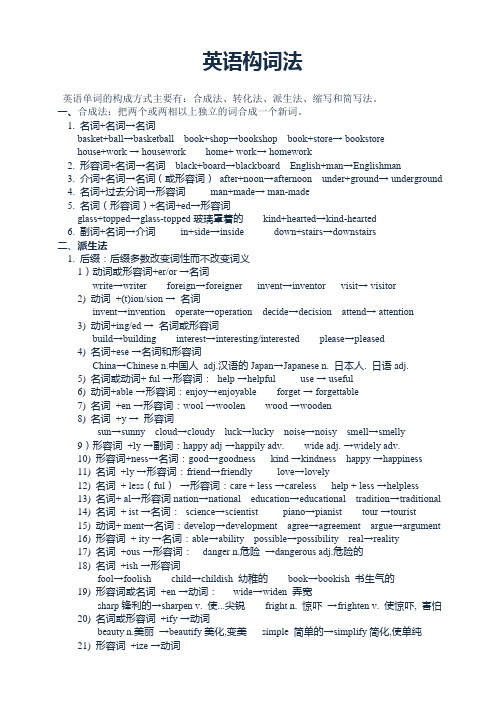
英语构词法英语单词的构成方式主要有:合成法、转化法、派生法、缩写和简写法。
一、合成法:把两个或两相以上独立的词合成一个新词。
1. 名词+名词→名词basket+ball→basketball book+shop→bookshop book+store→ bookstorehouse+work → housework home+ work→ homework2. 形容词+名词→名词black+board→blackboard English+man→Englishman3. 介词+名词→名词(或形容词)after+noon→afternoon under+ground→ underground4. 名词+过去分词→形容词man+made→ man-made5. 名词(形容词)+名词+ed→形容词glass+topped→glass-topped玻璃罩着的kind+hearted→kind-hearted6. 副词+名词→介词in+side→inside down+stairs→downstairs二、派生法1. 后缀:后缀多数改变词性而不改变词义1)动词或形容词+er/or →名词write→writer foreign→foreigner invent→inventor visit→ visitor2) 动词+(t)ion/sion → 名词invent→invention operate→operation decide→decision attend→ attention3) 动词+ing/ed → 名词或形容词build→building interest→interesting/interested please→pleased4) 名词+ese →名词和形容词China→Chinese n.中国人adj.汉语的Japan→Japanese n. 日本人. 日语adj.5) 名词或动词+ ful →形容词:help →helpful use → useful6) 动词+able →形容词:enjoy→enjoyable forget → forgettable7) 名词+en →形容词:wool →woolen wood →wooden8) 名词+y → 形容词sun→sunny cloud→cloudy luck→lucky noise→noisy smell→smelly 9)形容词+ly →副词:happy adj →happily adv. wide adj. →widely adv.10) 形容词+ness→名词:good→goodness kind →kindness happy →happiness11) 名词+ly →形容词:friend→friendly love→lovely12) 名词+ less(ful)→形容词:care + less →careless help + less →helpless13) 名词+ al→形容词nation→national education→educational traditio n→traditional14) 名词+ ist →名词:science→scientist piano→pianist tour →tourist15) 动词+ ment→名词:develop→development agree→agreement argue→argument16) 形容词+ ity →名词:able→ability possible→possibility real→reality17) 名词+ous →形容词:danger n.危险→dangerous adj.危险的18) 名词+ish →形容词fool→foolish child→childish 幼稚的book→bookish书生气的19) 形容词或名词+en →动词:wide→widen 弄宽sharp锋利的→sharpen v. 使...尖锐fright n. 惊吓→frighten v. 使惊吓, 害怕20) 名词或形容词+ify →动词beauty n.美丽→beautify美化,变美simple 简单的→simplify简化,使单纯21) 形容词+ize →动词real真的→realize了解, 实现memory n.记忆力→memorize v.记忆22) 动词+tive →形容词act行为→active adj. 积极的attract 吸引→attractive adj. 有吸引力的23)动词+ess →名词(女性)host主持→hostess女主人act扮演→actress女演员wait→waitress女侍者24)构成数词的后缀有-teen (十几),-ty (几十),-th (构成序数词)six六→sixteen十六→sixteenth第十六,four四→forty四十→fortieth第四十2. 前缀(前缀一般只改变词的意思而不改变其词性):1) un- (不,非,表示否定,形容词前缀)happy (高兴的) → unhappy(不高兴的)like (像) → unlike(不像)2) im- (不,无,非,表示否定,形容词前缀,常用在p, b, m开头的单词前)possible (可能的) → impossible(不可能的)polite → impolite3) in- (不,无,非,表示否定,形容词前缀)active →inactive complete →incomplete 不完全的4) dis-(不,非,表示否定,动词或形容词或名词前缀)honest→dishonest agree→disagree advantage优势→disadvantage不利5) mis- (表示错误):understand →misunderstand (误解) mistake (错误), misuse (误用)6) re- (再,重复):tell 叙述→ retell复述build 建筑→ rebuild 重建write →rewrite7) inter- (相互、交互、在一起):interview, international, internet8) kilo- (千):meter 米→kilometer 公里,千米gram 克→kilogram 千克9) micro- (微,小):microwave oven 微波炉microcomputer 微型电脑三、转化法:而无须借助词缀,就实现词类的转化。
高中英语构词法

(4)副词后缀
后缀
例词 carefully小心地;beautifully美丽地; quickly迅速地 forward向前;backwards向后; downwards向下;upwards向上
-ly
-ward(s)
领悟语法
用所给单词的适当形式填空 1.Her preparation course is helping her to get used to academic (academy) requirements of a Western university. 2. A fireman accidentally (accident) discovered the cause of the fire. 3.It cost approximately (approximate)$300—I can’t remember it exactly. 4. Beggars (beg) can’t be choosers. 5.Other disabled people find the website beneficial (benefit) because they can read about people with similar difficulties to their own.
形容词转化为 副词
real真的—— real真正地 deep深的—— deep深深地 sure确信的—— sure的确
三、派生法 派生法是英语主要的构词法。此方法是借助于前缀或后缀, 制造出派生词,主要有名词、形容词和动词三种。 1.前缀构词法 前缀是加在一个词根前面的音节,它并不是独立的单词,但 本身有一定的含义,它不改变词性,但改变原词义。
名词+名词
blood test验血;half-moon半月(形); silkworm蚕;classroom教室;airport飞 机场 double-dealer两面派;shorthand速记; greenhouse温室 reading room阅览室;meeting room会 议室;swimming pool游泳池 breakwater防波堤;pickpocket扒手 handwriting笔迹;sunbathing日光浴 get-together联欢会;breakthrough突破 downfall垮台;outbreak爆发
- 1、下载文档前请自行甄别文档内容的完整性,平台不提供额外的编辑、内容补充、找答案等附加服务。
- 2、"仅部分预览"的文档,不可在线预览部分如存在完整性等问题,可反馈申请退款(可完整预览的文档不适用该条件!)。
- 3、如文档侵犯您的权益,请联系客服反馈,我们会尽快为您处理(人工客服工作时间:9:00-18:30)。
2. 表示空间位置,方向关系的前缀
1) a- 表示“在……之上”,“向……” aboard, aside,
2) by- 表示“附近,邻近,边侧” bypath, bypass(弯路)
3) inter-, intel-, 表示“在……间,相互” international, interaction, internet
4) mid-, 表示“中,中间” midnight, mid-autumn
二、转化:
由一种词性转化为另一种或几种词性.
(1) 动词 名词: taste (v.) taste (n.)
It tastes good.
It has a good taste. (2) 名词 动词: hand (n.)
hand (v.)
Let’s go hand in hand.
Please hand in your exercise books after class. (3) 形容词 动词: clean (adj.) clean (v.)
一、合成
2. 合成动词: 副词+动词 overthrow uphold 形容词+动词 blacklist whitewash 名词+动词 sleepwalk sunburn
3. 合成形容词: 名词+形容词 snow-white lifelong 名词+过去分词 man-made hand made 数词+名词 one-way second-hand …….
后缀
- able -al -an
形 -ern 容 -est 词 -ful
-ish -ive -y -less -some
例词
advisable, admirable, comfortable physical, national, political American, Italian, Australian southern, northern, eastern fattest, latest, luckiest helpful, useful, careful British, English, foolish, childish active, instructive, expensive cloudy, windy, dirty, sunny careless, useless troublesome, tiresome
inland, invade, inside, import
10) under-, 表示“在…..下面,下的” underline, underground, underwater
11) up-, 表示“向上,向上面,在上” upward, uphold, uphill(上坡)
3.表示其他意义的前缀:
高三英语 构词法
合成法(Compounding)
构词法
派生法(Derivation) 转化法(Conversion)
缩略法(Abbreviation)
一、合成
由两个或更多的词合成一个词,有的用连词符号“-” 连接,有的直接连写在一起,还有的由分开的两个 词构成。
1.合成名词 名词+名词 cowboy newspaper 名词+ing handwriting sunbathing ing+名词 waiting-room sleeping-pill 形容词+名词 blackboard shorthand ……
名
-al -an
-cy
-er
-or
词 -ese
-ee
-eer
-ery
-ess
例词
inability, available leakage, shortage renewal, withdrawal American, Korean privacy, accuracy farmer, thinker, painkiller actor, sailor, collector Chinese, Japanese, Portuguese employee, trustee, interviewee engineer, profiteer machinery, jewellery actress, waitress, empress
2. 表示空间位置,方向关系的前缀
5) out-, 表示“在上面,在外部,在外” outline, outside, outward
6) over-, 表示“在上面,在外部,向上” overlook, overhead, overboard
7) extra-, 表示“额外” extraction (提取) 8) fore- 表示“在前面” forehead, foreground 9) in-, im-, 表示“向内,在内,背于”
• 不断记忆,积累词汇 • 夯实基础,学好语法 • 大声朗读,培养语感 • 坚持不懈,多做练习
Practice Makes Perfect!
词 -down
face-down, palm-down(手掌向下地)
-ward(s) towards, forward, outward
后缀
数 -teen 词 -ty
-th
例词
fourteen, fifteen, eighteen forty, fifty, eighty fourth, fifth, eighth
后缀
t -ism
-ment
-ness
-ship
词 -tion
-ure
例词
armful, handful, mouthful Egyptian, Russian, Asian, musician artist, pianist, communist, scientist socialism, realism, idealism government, movement, development business, illness, darkness friendship, ownership invention, liberation, education departure, failure, exposure
1.re--“又\,再” repeat, review, return, reunite, remarry 2. co—“联合,伴同” cooperate, coexist, co-worker 3. super—“在…上;加之” superman, supermarket
后缀
-ability
-age
Her room is clean and tidy.
She cleans her room everyday.
三、派生:
由一个词根加上前缀 或后缀构成另外一个词。
1.表示否定意义的前缀
dis- dishonest, dislike in-, ig-, il, im, ir, incapable, inability, ignoble, illegal,
后缀
-(e)n
动 -fy
词
-ize -ate
例词
widen, strengthen, lengthen simplify, beautify apologize, organize, realize activate, motivate
后缀
例词
副 -ly
really, badly, perfectly, truly
